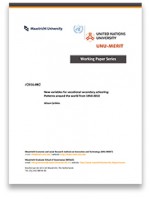Globalisation and the Knowledge-Based Society: Where does Europe Stand in Comparison to Other Regional Areas?
Economically, the last fifty years, the world has witnessed an unparalleled growth and transformation. Economic development has been spurred by the opening up and ensuing expansion of world trade and the dramatic reduction in barriers to capital movements, but it would only be fair to say that either in conjunction with such liberalisation or separate from it, the growth so-called “externalities” of knowledge have had a lot to do with the rapid post-war growth. First, under the form of the catching up of the European countries and Japan – the thirty glorious years (“les trente glorieuses” of Jean Fourastié, 1979) – in the 50’s, 60’s and early 70’s following the massive physical war destruction and second, the rapid take off of the so-called newly industrialising South East Asian economies in the 80’s and early 90’s. The third phase set in motion in the late 90’s with the world integration of large “emerging economies” such as Brazil, Russia, India and China (the BRIC countries) – compared by Richard Freeman (2005) with a doubling of the world labour force – could be said to be still in full swing requiring a much longer period of global adjustment, estimated at thirty years by Richard Freeman.

